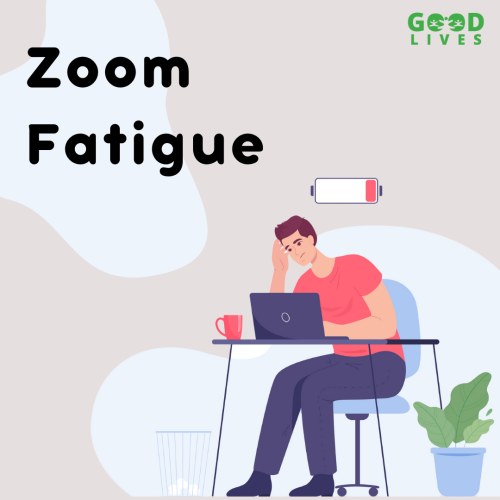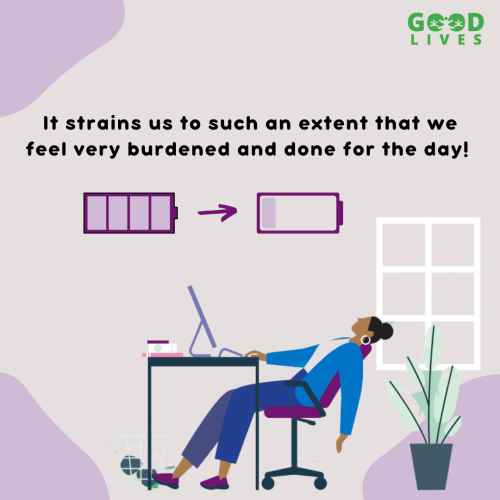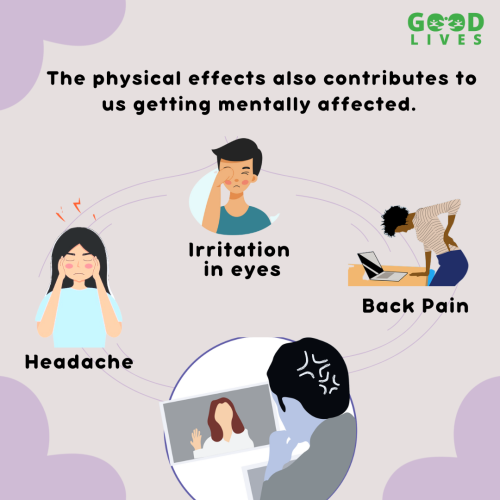WHAT IS ZOOM FATIGUE?

“Ouch! My back hurts!” “I’m so done for the day!” “Oh, I can’t sit and stare anymore!”
Have you experienced this on a daily basis while attending various online meetings for a prolonged period? Most of you are going to say, YES!
Zoom fatigue refers to the feeling of getting drained and exhausted after attending meetings every day. We might think that sitting for long meetings does not have any impact on us, as we just have to sit and not do anything physically, but, it affects us, both physically and mentally, and has strong implications on our psychological well-being.
So, yes! Zoom Fatigue is real!
Going to school, college and work were normal, until, covid-19 hit us. We, as humans, tried to find an alternative, and with the technological developments, came to the conclusion of shifting to an online mode of functioning. The first 3-4 months were absolute bliss as most people got the time to relax and gather their thoughts by staying home.
Time passed and the pandemic did not come to an end. That’s when small changes started taking place due to the time spent attending meetings. That is where zoom fatigue comes in.
Zoom fatigue affects us in several negative ways and there is a possibility that we don’t even notice it or blame it for some other reason. 80% of U.S. workers experience ‘Zoom Fatigue.
What does Zoom Fatigue do to us?
Long working hours and high dependence on technology have an undeniable impact on our physical and mental well-being. Constantly spending time looking at screens and attending various kinds of meetings drains us too much.
Zoom fatigue results in us feeling exhausted and burnt out to the core, which further results in distraction and boredom after a certain period. At the end of the day, we feel so restless which contributes to us being unproductive.
Do you know you can measure burnout? Check your burnout levels here!

The physical impact on health because of Zoom fatigue is rather subtle. Our back might get stiffer which can result in chronic back pain, as we tend to sit for long hours in one place.
Zoom fatigue results in a feeling of being stuck. It can also make a person feel very helpless and hopeless. We might feel like our head is getting heavier or lighter. We might feel irritation and pain in our eyes which results in excessive tearing, blurriness, increased blinking, and double vision.

Humans are social creatures. We always look up to something which acts as a driving force. That particular event motivates us to do things that we like, or may not like. We need human interactions but by evolution, we are not designed to look at screens for these interactions.
With the advancement of technology, there is a significant growth in zoom fatigue. But this doesn’t mean that there are no ways to manage Zoom fatigue.
Here are quick tips in which we can reduce the impact of zoom fatigue and that will help us remain fit.
4 Tips to Reduce Zoom Fatigue
1. Take a Break
Taking a break in between online meetings is very important. The break may not be long. It can be just a short 5-10 minutes break, but it should be a quality break. The break can include resting, lying on the bed for some time, going to the balcony and having a look outside, taking a short walk, etc.
You can also read self-help books. Check out our blog on Self-Help Books.
2. 5-4-3-2-1 Coping Technique
Focus on the “here and now”. Sit down, relax and observe.
(i) Observe 5 things that you can see.
(ii) Observe 4 things you can touch.
(iii) Observe 3 things you can hear.
(iv) Observe 2 things you can smell
(v) Observe 1 thing you can taste.
This technique is very helpful when it comes to calming and relaxing our running thoughts. It also helps us feel relaxed physically which results in mental relaxation.
3. Let’s Disconnect to Connect
Attending meetings is inevitable. Therefore, try to distance and disconnect yourself from technology at other times. Most of us use social media, watch movies, or play video games during our free time.
Disconnect from technology and connect with yourself by taking out time for things that you love to do to enjoy and feel good about yourself and your day. Connecting with ourselves is as important as connecting with others through zoom. Zoom fatigue results in us being restless and tired, which does not allow us to take care of ourselves.
Therefore, try to engage with activities that you love, to connect with your true self, which would help you to reduce the effects of zoom fatigue.
4. Optimize Your Meetings
Invite only those on call who are required to be present. The aim should be to keep the calls smaller. We at GoodLives follow this technique to reduce video call fatigue. In our meetings, we try to talk to our employees as and when required. When the required conversation with one is complete, people can leave the meeting. This reduces zoom exhaustion and lessens screen time.
Zoom fatigue might feel inescapable, but what we need to believe is that we have the power to make a difference in how we think, and following the above 5 tips would help us reduce zoom fatigue.
If zoom fatigue is affecting you too much then try talking to a professional about it. Book your session here.
LET’S WIN AGAINST ZOOM FATIGUE!
0 Comments